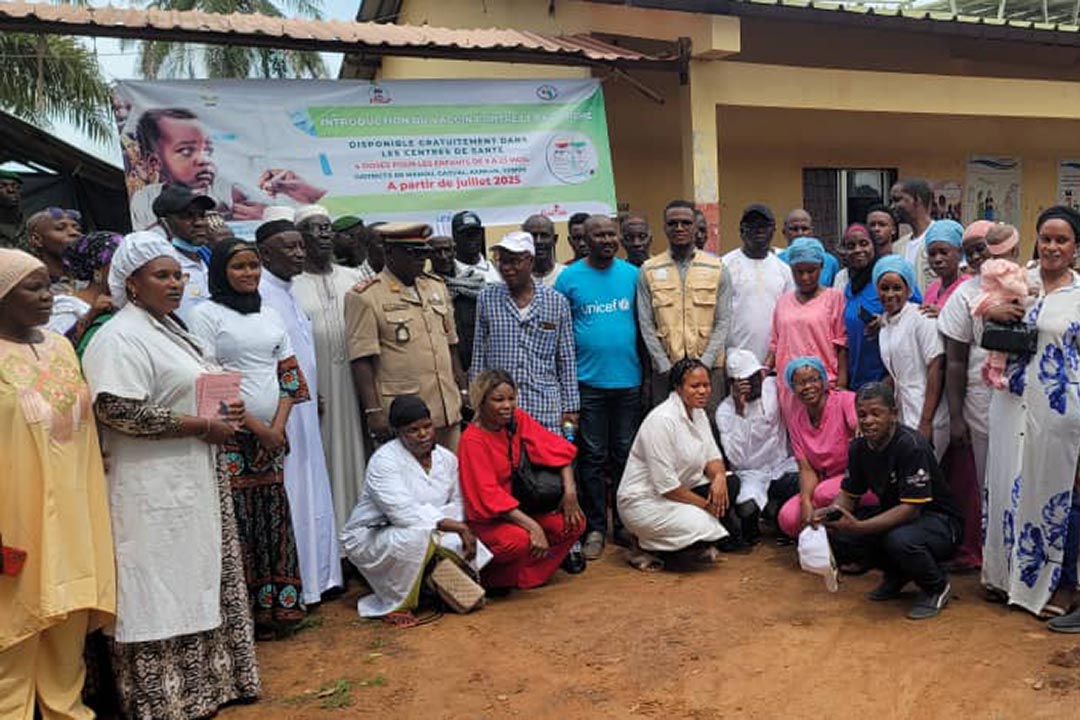Conakry, 13 August 2025 – Under the leadership of the Ministry of Health and Public Hygiene, and with the support of Gavi, the Vaccine Alliance, the World Health Organization (WHO), UNICEF and PATH, Guinea today officially introduced the malaria vaccine into its Expanded Programme on Immunization (EPI). This historic milestone marks a major turning point in the fight against malaria, which remains the leading cause of child morbidity and mortality in the country.
In 2023, Guinea recorded an estimated 4.43 million malaria cases, according to the 2024 WHO World Malaria Report, underscoring the country’s continued high burden of the disease. Malaria accounts for more than a third of consultations and hospitalizations in public health facilities and remains the leading cause of death among children under five. In 2023, the parasite prevalence was 17% among children under five years of age, reaching more than 30% in some areas such as Guinea Forestière.
Faced with this scourge, the introduction of the RTS, S malaria vaccine is a major public health response. Already tested and widely used in Ghana, Kenya, Malawi, and other countries, this vaccine has demonstrated a significant reduction in hospitalizations and mortality in vaccinated children.
“With the introduction of the malaria vaccine, Guinea is taking another historic step forward in its fight against malaria. This decision aligns with our vision of ensuring that every child starts life protected from preventable diseases. We are committed to strengthening a health system capable of protecting our populations throughout the country in the long term," said Dr. Oumar Diouhé Bah, Minister of Health and Public Hygiene.
With this initiative, Guinea joins a growing group of African countries – now 21 – that have integrated malaria vaccine into their national immunization programmes. Beginning in August 2025, the vaccine will be available in four districts with moderate to high transmission: Mamou, Gaoual, Kankan, and Yomou have approximately 60,000 children eligible for vaccination each year. All children aged 5 to 11 months in these districts will be able to receive the malaria vaccination, which requires four doses for optimal protection.
Gavi, the Vaccine Alliance, in collaboration with alliance partners such as the WHO, UNICEF, PATH, and national governments, facilitates the procurement, logistics, and integration of vaccines into national immunization programs. The Alliance's strategic investments in strengthening health systems, including cold chain infrastructure, human resources, and data systems, ensure the sustainable supply of vaccines.
The vaccine is completely free, given from 5 months of age, and does not replace other prevention methods such as insecticide-treated nets. It complements these strategies to provide maximum protection.
“The introduction of the malaria vaccine in Guinea is a powerful step toward equity in global health—bringing life-saving protection to children who need it most. To fully realize the promise of this vaccine and reach millions more children across Africa, we urgently need continued and increased investment. With sustained funding, we can ensure that no child is left behind in the fight against Africa’s deadliest disease," said Demba Diack, Gavi Representative in Guinea.
The introduction of the vaccine is part of an integrated approach to malaria control, combining prevention, treatment, vaccination and community awareness. At the same time, communication campaigns are being deployed to inform families, mobilize community leaders and promote adherence to vaccination.
"Malaria vaccines are a big step forward for children's health and the fight against malaria. The malaria vaccine is now being introduced, and more children are getting it. This vaccine is effective and safe. It has already been used successfully in more than 20 countries in Africa. It has reduced the number of child deaths and increased access to malaria prevention methods. We encourage the country's health authorities to slowly start using this vaccine throughout the country," said Dr. Mouctar Kande, Immunization Program Officer at WHO Guinea. "The WHO is committed to working with the country's health authorities and partners to support the rollout of malaria vaccines so that more children can benefit from this additional protection against malaria as quickly as possible," he concluded.
The introduction of the vaccine is part of an integrated approach to malaria control, combining prevention, treatment, vaccination, and community awareness. Concurrently, communication and social mobilization activities are being implemented to inform families, mobilize community leaders, and promote uptake of the vaccine.
"The introduction of the malaria vaccine in Guinea is a turning point in our efforts to protect children from this preventable disease. For too long, malaria has been the leading cause of death and illness among children under five in Guinea and a major cause of absenteeism among primary school students. UNICEF is committed to supporting the government and its partners in equitably implementing this historic initiative and strengthening our collective efforts to ensure that every child in Guinea has access to essential healthcare and can grow up safely, regardless of where they live or how poor they are,” said Maddalena Bertolotti, UNICEF Representative in Guinea.
As part of introducing the malaria vaccine, UNICEF supported delivering 568,400 doses, distributing them to districts, reproducing, distributing, and disseminating communication tools and radio and TV spots, training health workers in health posts, training trainers and local and community actors in communication, and financing the national launch ceremony.
U-Reporters were mobilized to relay key messages, raise awareness in their communities, and encourage parents to vaccinate their children, thereby strengthening community support and participation in the campaign.
The demand for this powerful tool is still high. Gavi aims to fully vaccinate more than 50 million children between 2026 and 2030.
MEDIA CONTACTS
Eunice Kilonzo-Muraya, Gavi
+41 76 424 85 03
ekilonzo@gavi.org
Meg Sharafudeen, Gavi
+41 79 711 55 54
msharafudeen@gavi.org
Kadiatou Baldé, Guinea EPI
Head of Communications
+224 624 82 75 29
kadiatoubalde.pev.gn@outlook.com
Dr Mouctar KANDE, WHO Guinea
Immunization Program Officer
+224 622 674 000
kandem@who.int
Venatius Fon, UNICEF Guinea
Partnerships Specialist
+224 626940185
vfon@unicef.org

